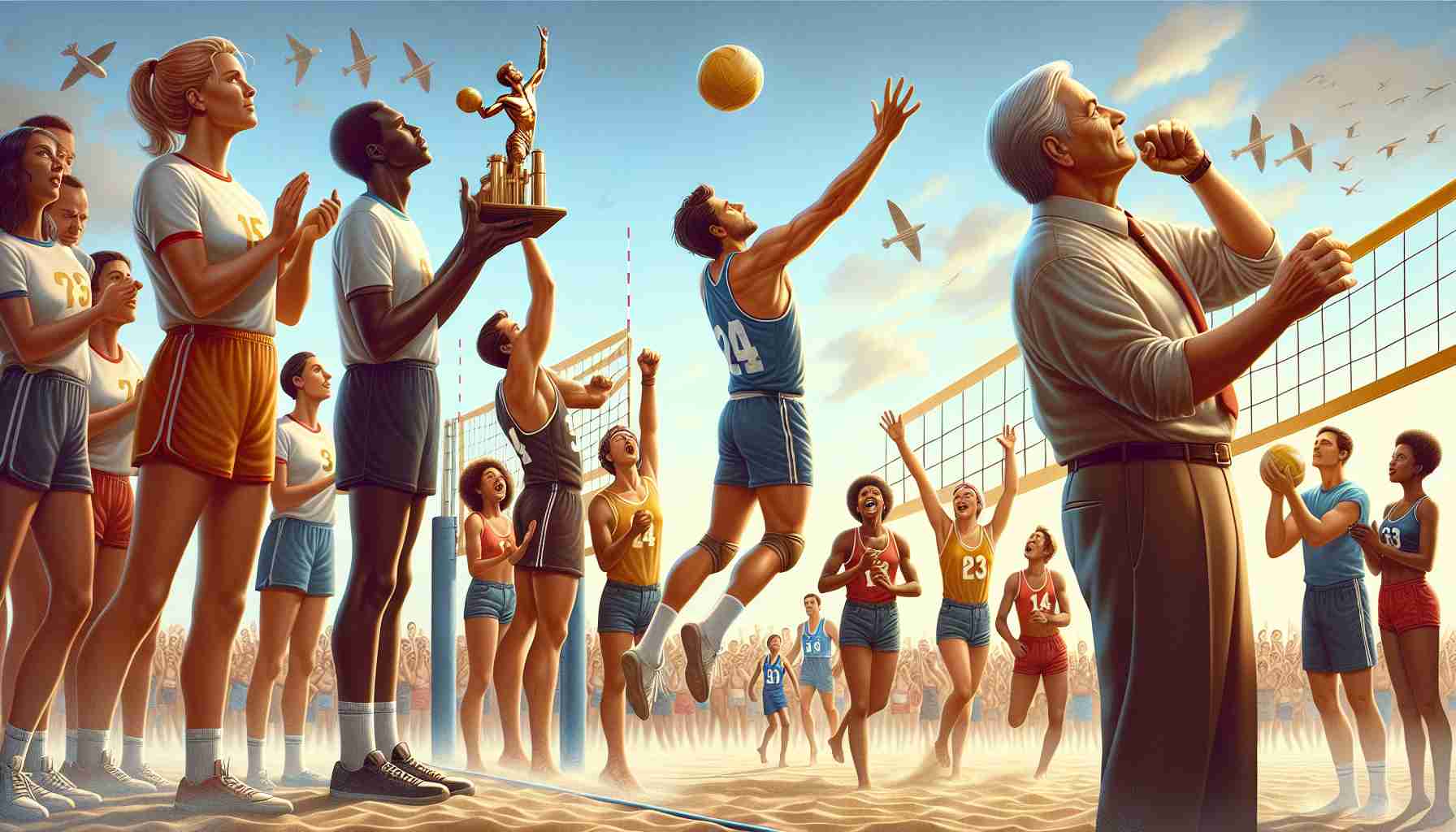The story of Toshikazu Kawai is one of resilience and inspiration. Once a standout player on Japan’s national volleyball team, Kawai shone brightly during two Olympic Games. Now, as the president of the Japan Volleyball Association, he shares his incredible journey on the TV Asahi program “Tetsuko’s Room.”
Reflecting on his athletic career, Kawai humorously recounts interactions with younger generations, who often question why someone with his height didn’t pursue a sport. His charm and approachable nature shine through, reminding viewers of his popularity during his playing days. In a lively discussion, the host, Tetsuko Kuroyanagi, is left giggling by Kawai’s anecdotes.
Kawai attributes his success to his late father, who passed away two years ago at 90. He reminisces about their time together during his formative years, where he would spend two hours each evening alongside his father, engaging in discussions over drinks and receiving guidance. This bond not only sparked his interest in volleyball but also shaped his character.
In addition to his father’s influence, Kawai bravely shares a personal story about a health scare involving a polyp surgery, where he faced a moment of panic, believing he had passed away. Through his journey, Kawai exemplifies the spirit of athletics and personal growth, captivating audiences both past and present.
Beyond the Court: The Broader Impact of Athletic Stories
Toshikazu Kawai’s journey extends beyond individual resilience; it symbolizes the profound influence of sports on society and culture. His narrative demonstrates how athletic figures can serve as role models, shaping youth aspirations and community pride. In Japan, where sports foster national identity and camaraderie, Kawai’s story resonates deeply, illustrating the potential for sports to bridge generational divides. His experiences highlight the importance of mentorship, a cornerstone not only in sports but in social dynamics, influencing the way youth interact with potential mentors in their own lives.
Economically, Kawai’s presence in sports leadership can steer investments in volleyball, enhancing the sport’s infrastructure and visibility. As countries vie for global sporting prestige, effective leaders like Kawai contribute to the global economy by promoting local sports industries, potentially increasing tourism through events and boosting merchandise sales.
Moreover, the environmental implications of sports management, particularly in terms of sustainable practices in organizing events, cannot be overlooked. As Kawai advocates for responsible stewardship within athletic programs, this awareness could pave the way for initiatives that prioritize ecological sustainability, ensuring future generations of athletes can thrive in healthy environments.
As long-term significance unfolds, Kawai’s personal narrative will likely inspire future leaders within Japan’s sports community, urging a focus not just on winning, but on character development and societal impact.
The Resilient Journey of Toshikazu Kawai: From Olympic Star to Volleyball President
The Path of Inspiration
Toshikazu Kawai’s life story is more than just about sports; it’s a narrative of resilience, personal growth, and inspiration. Known as a former standout player for Japan’s national volleyball team, Kawai graced the Olympic stage and has left a significant mark not only on the sport but also on the community he engages with today as president of the Japan Volleyball Association.
Key Features of Kawai’s Career
– Olympic Participation: Kawai represented Japan in two Olympic Games, solidifying his status as a prominent figure in volleyball and inspiring future generations of athletes.
– Leadership Role: As the president of the Japan Volleyball Association, Kawai influences the direction and growth of volleyball in Japan, fostering new talent and promoting the sport across various platforms.
Personal Growth and Reflection
In a recent episode of TV Asahi’s program “Tetsuko’s Room,” Kawai shared humorous anecdotes reflecting on his playing days, especially in light of his interactions with younger fans who question his height in a sport often dominated by taller players. His charming demeanor and ability to connect with a younger audience demonstrate his enduring popularity and relatability, even years after his athletic career.
Lessons from Family
Kawai attributes much of his success to the impactful relationship he had with his late father, who passed away at the age of 90. Kawai speaks fondly of the two-hour conversations they shared each evening, highlighting how these discussions shaped not only his passion for volleyball but also his character and life philosophy.
Health and Resilience
In addition to sharing memories of his father, Kawai bravely opened up about a personal health scare involving polyp surgery. His story serves as a powerful reminder of the importance of mental strength and resilience in overcoming life’s challenges.
Pros and Cons of Kawai’s Leadership
Pros:
– Inspires the next generation of volleyball players.
– Promotes community involvement in sports.
– Acts as a role model for resilience and personal growth.
Cons:
– High expectations may lead to pressure on upcoming athletes.
– Balancing leadership duties with personal advocacy can be challenging.
Predictions for the Future of Volleyball in Japan
As Kawai continues to lead the Japan Volleyball Association, several trends can be anticipated:
– Increased youth participation in volleyball programs.
– Greater emphasis on mental health support for athletes.
– Enhanced visibility and investment in women’s volleyball, aiming for equality in sports.
Conclusion
Toshikazu Kawai’s journey from an Olympic star to a respected leader in the volleyball community demonstrates the impact one individual can make on a sport and its surrounding culture. His story is a testament to the power of resilience, the importance of family, and the ability to inspire others through sharing one’s experiences. To follow Kawai’s journey and learn more about his initiatives, visit the Japan Volleyball Association.
